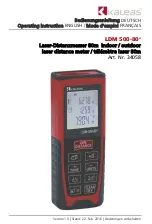
Oxygen Analyzer
Part I: Control Unit
Part I: 4-15
Go to
Ltch–
and then press either
∆
two times or
∇
two times.
(Toggle it to
N
and back to
Y.
)
4.6
The
Range Function
The Range function allows the operator to program up to three concen-
tration ranges to correlate with the DC analog outputs. If no ranges are
defined by the user, the instrument defaults to:
Range
Limits
Low
0–1 %
Med
0–5 %
High
0–10 %.
The Model 3010PA is set at the factory to default to autoranging. In this
mode, the microprocessor automatically responds to concentration changes
by switching ranges for optimum readout sensitivity. If the current range
limits are exceeded, the instrument will automatically shift to the next higher
range. If the concentration falls to below 85% of full scale of the next lower
range, the instrument will switch to that range. A corresponding shift in the
DC percent-of-range output, and in the range ID outputs, will be noticed.
The autoranging feature can be overridden so that analog output stays
on a fixed range regardless of the oxygen concentration detected. If the
concentration exceeds the upper limit of the range, the DC output will
saturate at 1 V dc (20 mA at the current output).
However, the digital readout and the RS-232 output of the concentra-
tion are unaffected by the fixed range. They continue to read accurately with
full precision. See Front Panel description in chapter 1.
The automatic air calibration range is always 0-25 % and is not pro-
grammable.
4.6.1 Setting the Analog Output Ranges
To set the ranges, enter the range function mode by pressing the
Range
button on the front panel.
L### M####
H##### ModeAUTO
Use the < > arrow keys to blink the range to be set: low (
L
), medium
(
M
), or high (
H
).
Summary of Contents for 3010PA
Page 17: ...1 6 Part I 1 Introduction Model 3010PA ...
Page 21: ...2 4 Part I 2 Operational Theory Model 3010PA ...
Page 57: ...iv Part II Model 3010P Oxygen Analyzer ...
Page 69: ...2 8 Part II 2 Operational Theory Model 3010P ...
Page 77: ...3 Installation Model 3010P 3 8 Part II ...
















































